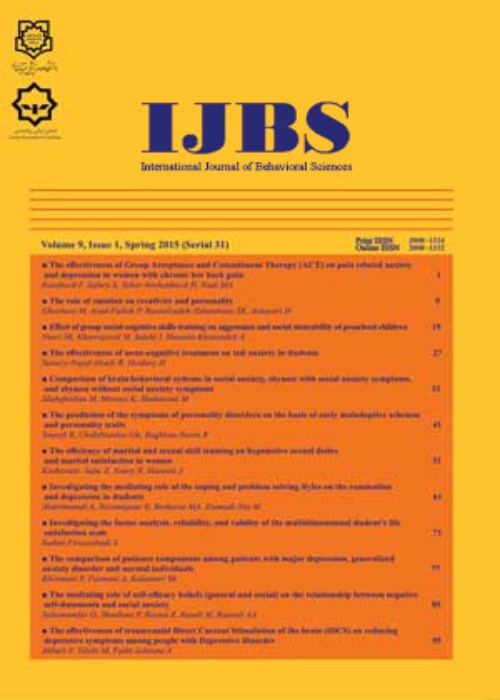Effectiveness of motivational interviewing on the weight self-efficacy life style in overweight and obese teenager boys
Author(s):
Abstract:
PhD condidate Baqiyatallah University of Medical Sciences, : Study Type: Research | Subject: Behavioral Sciences | Received: 2013/11/25 - Accepted: 2014/07/14 - Published: 2014/07/14 Article abstract:
Introduction
Childhood and teenager obesity as an international growing health problem is predisposing adolescents to chronic, incapacitating and lethal diseases in adulthood. This situation has motivated many researchers to establish effective weight controlling programs with psychological approaches.The purpose of this study was to determine the effect of motivational interviewing on weight self-efficacy lifestyle of teenaged boys suffering from overweight or obesity.Method
This research is a controlled clinical trial in pretest and post-test design with repeated measurments which was conducted on a control group plus 2 experimental groups in 1391. Sample and control groups comprised 90 high school students, between 15 to 19 years old, with BMI over 25, who were selected through accessibility sampling then were randomaly allocated to 2 experimental groups and 1 control (each group=30). Control group received no intervention. But experimental group 1 (named instruction group) was administered regular weight controlling instruction by way of diet for 4 sessions (each was 2 hours) and experimental group 2 got likewise extra to motivational interview for 5 sessions of 2 hours during 5 weeks (in 3 groups of 10 individuals). Data were collected in 4 stages of measurement via weight self-efficacy lifestyle questionnaire and then were analyzed using statistical tests of one-way analysis of variance and repeated measures analysis of variance. Results
Increase in mean scores of self-efficacy in both experimental groups but more in group 2 was observed. Comparison of the groups in every stage of the measurement using ANOVA was suggestive of no significant difference through the pretest and post-test; nevertheless, there was significant difference between follow-up-stage 1 (p=0.002) and follow-up-stage 2 (p=0.024). Additionally, the comparison of experimental groups using RMANOVA through the four stages of measurement indicated statistically significant difference between experimental group 2 (p=0.000) and experimental group 1 (p=0.000) while there was no significant difference as for control group (p=0.65). Overall, the comparison between groups through the all stages of measurement showed statistical significant difference (p=0.000). Conclusion
Motivational interviewing along with regular weight controlling instruction can increase weigh self-efficacy lifestyle of teenaged boys with overweight and obesity in order for the change of behavior with regard to weight controlling.Keywords:
Language:
Persian
Published:
International Journal of Behavioral Sciences, Volume:8 Issue: 2, 2014
Page:
185
magiran.com/p1315884
دانلود و مطالعه متن این مقاله با یکی از روشهای زیر امکان پذیر است:
اشتراک شخصی
با عضویت و پرداخت آنلاین حق اشتراک یکساله به مبلغ 1,390,000ريال میتوانید 70 عنوان مطلب دانلود کنید!
اشتراک سازمانی
به کتابخانه دانشگاه یا محل کار خود پیشنهاد کنید تا اشتراک سازمانی این پایگاه را برای دسترسی نامحدود همه کاربران به متن مطالب تهیه نمایند!
توجه!
- حق عضویت دریافتی صرف حمایت از نشریات عضو و نگهداری، تکمیل و توسعه مگیران میشود.
- پرداخت حق اشتراک و دانلود مقالات اجازه بازنشر آن در سایر رسانههای چاپی و دیجیتال را به کاربر نمیدهد.
In order to view content subscription is required
Personal subscription
Subscribe magiran.com for 70 € euros via PayPal and download 70 articles during a year.
Organization subscription
Please contact us to subscribe your university or library for unlimited access!


